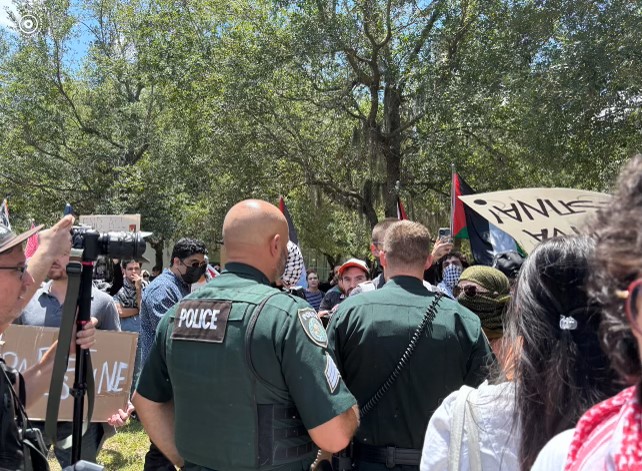USF leaders applaud response to campus protests despite criticism

Encampment protests asking USF to divest from companies with financial ties to Israel rocked the Tampa campus at the end of April, drawing national and local criticism of the university’s response.
Law enforcement arrested 13 people – including some USF students – and used tear gas to disperse demonstrators after they were told to vacate an encampment.
At Tuesday’s Board of Trustees meeting, President Rhea Law and Board Chair Will Weatherford reiterated their support for law enforcement and administration’s actions during the on-campus protests.
“I’m proud of the campus police and the way that they manage themselves and represent the university,” Weatherford said towards the end of the meeting. “I’m proud of law enforcement for being by our side and helping us navigate a thorny situation.”
The comments, which bookended the meeting, echoed Law’s and Weatherford’s statements from a universitywide email sent the day of the protests.
Law began her remarks to the board by acknowledging the “national attention” on the protests. She said that, though free expression in public places is allowed, USF condemns “hate speech and incidents of anti-semitism, Islamophobia and bigotry.”
“We recognize our obligation to permit constitutionally-protected speech, even if we strongly disagree or find some of what is said to be offensive,” she said.
However, she said the university’s obligation to allow free speech goes hand-in-hand with the speakers’ obligation to be peaceful.
During the encampment on April 30, around 100 demonstrators demanded that USF divest. Police officers wore riot gear while protesters used makeshift wooden shields and umbrellas as they locked arms in a circle.
People at the protest have criticized police response, characterizing it as aggressive. Protester and former hunger-striker Alina Atiq said she was revolted at the university’s response during a press conference with the Council on American-Islamic Relations Florida, a nonprofit civil rights group.
“They ignored every one of our divestment efforts and then when we escalated to have our voices heard, they unleashed hundreds of riot police to incapacitate us with chemicals, tackle us to the ground, beat us up, choke us out, dogpile us, run us over on their bikes, and arrest us for simply exercising our right to peacefully protest,” Atiq said.
Several protesters are charged with misdemeanors, including trespassing, unlawful assembly and resisting arrest. Other protesters charged with felonies include resisting an officer with violence. One protester who was found with a gun is charged with felony possession of a firearm on school property.
Related: Pro-Palestine encampment protest at USF broken up by tear gas – The Oracle
Weatherford addressed the protests as the meeting was wrapping up. He said there won’t ever be “anarchy” on campus.
He also said law enforcement’s actions allowed for USF’s Commencement ceremonies – which began just three days after the protest – to go smoothly.
“I appreciate your leadership, Madam President, the leadership of our team that was on site and monitoring very closely, and the leadership of law enforcement to help us navigate,” Weatherford said.
We need support from readers like you. Learn how
Civil rights groups have criticized both state and university officials’ response to the protests, saying it threatened demonstrators’ First Amendment rights.
Related: USF can place protest restrictions, First Amendment expert says
Howard Simon, interim executive director of the American Civil Liberties Union of Florida, said in a May 1 statement that university administration has to respect the right to free speech and peaceful protest.
“Universities are meant to be havens for robust debate, discussion and learning — not sites of censorship where administrators and politicians squash political discourse they don’t approve of with threats, arrests, rubber bullets and tear gas,” Simon said.
Some nonprofit civil rights groups requested a meeting with Ray Rodrigues, the state university system chancellor, to discuss the response to the series of on-campus protests in Florida, as reported by the Tampa Bay Times. In a pair of letters sent to Rodrigues in May, the groups said using tear gas was “wholly inappropriate and dangerous.”
The groups involved with the request include the Florida chapters of PEN America, the American Civil Liberties Union, Equality Florida and the NAACP, according to the Tampa Bay Times.
During the meeting, Weatherford also pointed out that most of the protesters arrested by law enforcement were not USF students. But he reiterated that everyone has a right to protest at a public university as long as it is in “accordance with our rules and our laws.”
Between the two protests on April 29-30, law enforcement arrested 13 demonstrators. This includes five USF students, a WUSF employee and three alumni, according to a university spokesperson.
Related: USF encampment protesters call for charges to be dropped
Weatherford said though USF respects the right to free speech, they will not “put up” with disruptions to everyday business.
“We’re not going to allow people to create situations that have the opportunity to be dangerous,” he said.








